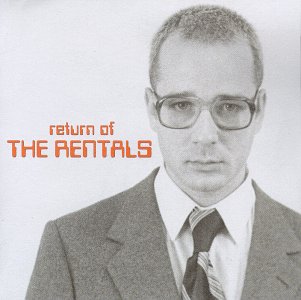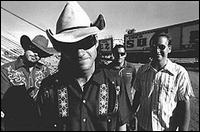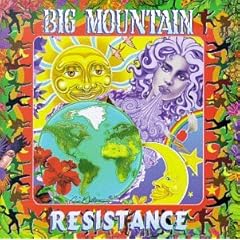 Crazy Town - "Butterfly" (Columbia Records, February 2001; from the album The Gift of Game, 1999)
Crazy Town - "Butterfly" (Columbia Records, February 2001; from the album The Gift of Game, 1999)What can I possibly say about LA-based rap-rockers Crazy Town that hasn't already said by anyone who has ever laid eyes on the band members (and has a decent sense of humor)? What can I say about their hit "Butterfly" that hasn't been run into the ground by the likes of Hal Sparks or Mo Rocca on VH1's umpteenth talking head list program? The answer is probably nothing, but that's never stopped me before.
According to Wikipedia, Crazy Town (who are listed in the genres of "Rapcore," "nu metal" and alternative rock, hip-hop and metal) formed in 1995 after "Epic" (Christian name Bret Mazur) and "Shifty Shellshock" (Seth Binzer) began collaborating on music, but the band did not become "serious"(clearly the Wiki writers got a little loose with the adjectives) about making a go for the big time until several years later. By the late '90s, the duo had recruited a bunch of other dudes who had gelled hair and a truly unnecessary amount of tribal tattoos, christened them with ridiculous, nonsensical names like "SQRL" and "Faydoedeelay", and finagled a record contract out of Columbia Records bosses. By Thanksgiving 1999, the group's album, The Gift of Game, was on the shelves of every Sam Goody and Camelot in every galleria in the country. Unfortunately for Shifty and the gang, the album was nothing special. Another faceless attempt at rap-metal, cashing in on the success of superior (but still shitty) bands like Limp Bizkit and Korn and ignoring anything that might make either of those bands special. The band got a spot on the 2000 Ozzfest tour which allowed Mr. Shellshock to express himself artistically by cracking open a case of Natty Light, greasing himself up, showing off his pecs and Chinese letter tattoos to hoardes of flabby white men in black t-shirts, and pretending to be a rock star. However, this pretending got him into some hot water with the powers that be (most likely Sharon "I'm a horrible person" Osbourne). Shellshock was thrown off the tour two weeks in after doing what he no doubt assumed was simply his rockstar duty--throwing furniture through a glass window.*
Now, I have to side with Señor Shellshock on this one (this is a rant, so skip to the next full paragraph if you don't want to take the scenic route). If you're in a metal band, and you're on a tour named for a man who once tried to impress Nikki Sixx by snorting a line of ants up his nose, and your band is called Crazy Town, it seems like a logical conclusion to assume that, people want you to drink like an asshole and then act like a chemically unbalanced rockstar, even if you're just a chemically unbalanced dude. It worked for Axl Rose, right? It worked for Keith fucking Moon and at least three members of Led Zeppelin, right? Ben Franklin did it. That's historical permission to get wasted and be a prick. Okay, so you could maybe argue that Percy Shellyshock should have waited until his band was headlining Ozzfest, or at least their own tour, before putting a chaise lounge through the French doors, but these are merely details--details a student rockstar cannot be bothered with when all that stands between him and complete rockstar freedom is a couple of inches of glass. So the guy isn't quite Axl--do you think Axl became Axl overnight? No! It took practice; years of pro-bono work smacking around normal girls and freaking out at concerts in dive bars before graduating to supermodels and stadiums. Throwing a chair out a window is Rock Star 101. No one was injured. This isn't Advanced Rockstar Fuckery where you smack photogs, get the cops called on you by your supermodel girlfriend, and incite riots in Canadian provinces. So screw you, Sharon Osbourne, or whoever kicked them off the tour--take a look at yourselves! People in glass houses shouldn't throw stones--they should throw chairs (or something? bear with me; this made sense in my head). And who knows? Maybe the chair really needed to go out the goddamn window.
MOVING ON. Crazy Town's brand of hip-hop-inspired "nu metal" came during the death rattle of the "rap-rock" genre: Limp Bizkit monkey man guitarist Wes Borland departed his band in order to devote his attention to his Ween-inspired band, Big Dumb Face. The likes of Kid Rock had begun to explore other genres like uninspired country-rock, and while nu metal bands like Korn continued to flourish thanks to a strong fanbase, and Johnny-come-latelys Linkin Park managed inexplicably to find success, the salad days of the genre were mostly over and the mainstream tide had begun to turn away from rap-metal. Fans were growing up and either turning their attention to lesser known metal bands, hip-hop acts, or exploring other burgeoning genres like the neo-garage rock scene spearheaded by The White Stripes and The Strokes.
So how did Crazy Town still manage to hit? Easy. Their song had absolutely nothing to do with nu metal. Sure, the guys looked like nu metal guys in their video, but they were playing what was essentially a dance song, just like a few years earlier when Sugar Ray had looked like hard rock guys (and considered themselves as such), but were playing beach music.
"Butterfly" was unleashed on an unsuspecting public in February 2001, almost two full years after the band had released their album. Clearly, someone at the record company was determined to squeeze a hit out of an album that had been sitting on shelves for 18+ months. Why this happened, we may never know, but this is my theory:
There was a lowly A&R manager at Columbia Records who just couldn't catch a break. Maybe he'd spent all his time pushing indie bands and getting nowhere, and his bosses told him he better have a hit band, or he'd soon be collecting unemployment. Desperate, the manager spent a sleepless night at the office, sifting through hundreds of already released songs on his first generation iPod, looking for a hit. Just when he was ready to give up, "Butterfly" played. At first he took no notice of the song, as it was by a band that had two DOA singles ("Toxic" and "Darkside") and an album that had stalled after selling 100,000 copies. But, as he listened to the song, (which is nothing more than a guy rapping over a 5-second sample of John Frusciante's guitar part on Red Hot Chili Peppers' instrumental "Pretty Little Ditty" from 1989's Mother's Milk) he realized, not unlike the creators of the atomic bomb, that what he was listening to had potential; the type of potential that, if exposed to humans, could harm, maim, and maybe kill millions. The A&R guy knew what he had to do. He immediately destroyed his iPod and all copies of the song he could find and, after a few hours of having "yo' my buttafly/suga, baby" stuck in his head, went home and shot the jukebox in his head (read: he killed himself). But he made one mistake: he wrote down the name of the song and artist on a Post-It note. The next morning, an even lowlier intern was clearing out the now deceased A&R guy's desk and came upon the Post-It note reading: "Crazytown (sic) - Butterfly." Within 48 hours, the intern had devliered the song to top execs, who then released the song to radio stations and Tower Records as a single. A video soon followed. When the song hit #1 on the Billboards in 15 countries and sales of The Gift of Game surpassed 1.5 million, the intern was promoted to A&R executive status and made millions of dollars, spent it all on Patrón, cocaine and a McMansion in the Hollywood Hills, joined the Church of Scientology, banged Willa Ford for two weeks, and lost it all when he put all his money and effort behind Nick Lachey's solo career. He now spends his days wandering around Silverlake, filthy, his eyes crazed, and wearing nothing but a sandwich board sign on his shoulders that reads (side 1) "What hath God wrought?" and (side 2) "Butterfly".
This video is presented without comment, but honestly, flying tattoos? What the hell?
A follow up single, "Revolving Door," enjoyed predictably poor results on the charts, but it didn't matter; the damage had been done.*This also marked the departure of the band's DJ, DJ AM aka Adam Goldstein, who would later become famous for a) spinning at parties thrown by Kate Hudson and other minor celebs, b) boning both Nicole Richie and Mandy Moore, c) barely surviving a plane crash with Travis from Blink 182, and d) dying of a drug overdose in August 2009, two days after the reformation of Crazy Town (I don't say that to be a jerk, but his death really did make him known to people like my mom). Goldstein actually quit the band twice: once quitting after the first Ozzfest incident, only to return after the success of "Butterfly", and leaving once again before the recording of the second album. Inexplicably, Goldstein was actually the second former member of Crazy Town to die after "Rust Epique" aka Charles Lopez, the original guitarist who had left the band for a solo career while The Gift of Game was still being mixed and died of a heart attack in 2004. I'm not going to say there's some sort of curse on Crazy Town, because that Shifty Shellshock guy is still alive despite the best efforts of Dr. Drew and Andy Dick.
Charts: As previously mentioned, the song went to #1 in 15 countries and hit #1 for two consecutive weeks on two different charts (Hot 100 and Modern Rock).
Legacy: What, you mean besides having made one of the most annoying songs of the decade? Possibly ever? Or the fact that they basically gave anyone who is anti-sampling a beyond perfect example of how mind-numbing, repetitive and just plain uncreative sampling can be? Well, there was that great scene in Jake Kasdan's Orange County where the main character (played by Colin Hanks) realizes that the people at Stanford parties are just as horrible as the people at his school, illustrated by a scene of college girls dancing to, you guessed it, "Butterfly".
Where Are They Now? Besides DJ AM, Shifty Shellshock aka Seth Binzer is the only member that anyone remembers or has seen since 2001. After the band's follow-up album, 2002's Darkhorse, failed to deliver another "Butterfly" (which I realize is sort of like saying, "after the US failed to deliver another Hiroshima"), the band broke up. Also in 2002, Binzer guested on Paul Oakenfold's "Starry Eyed Surprise" single, which basically just sounded like another bad Crazy Town song, though 33% less annoying. In 2004, only a year after the band's break up, Binzer released a solo album (as Shifty Shellshock), Happy Love Sick.
2008 saw Binzer joining the cast of VH1's Celebrity Rehab and later Sober House, a celeb-reality show hosted by Dr. Drew about celebrities supposedly in the final stages of treatment, attempting to kick their habits for good. Binzer is best remembered for a relapse in which he disappeared from the premises and posted bizarre videos to his MySpace that gave his housemates (which included Andy Dick) clues as to his whereabouts. Binzer, who was addicted to crack cocaine and an alcoholic, was so good at being sober (or at least, so entertaining at being not sober), that he appeared on Sober House 2.
In 2007, someone played a sick joke on Crazy Town and told them it might be a good idea to reunite (I suspect Ashton Kutcher, though only Sascha Baron Cohen would have the balls to do something so politically charged and sick). It was announced in 2008 that they would be working on a new album, Crazy Town Is Back. According to Wikipedia, the album has been delayed (translation: Obama stepped in).
In August 2009, Crazy Town regrouped for a one-off show at Les Deux in Hollywood.
Runners-Up:
Afroman - Because I Got High
Willa Ford - I Wanna Be Bad
Alien Ant Farm - Smooth Criminal (Michael Jackson cover)


























